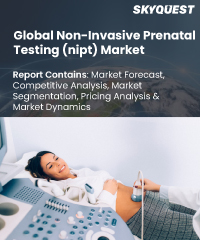
Report ID: SQMIG35J2080

Report ID:
SQMIG35J2080 |
Region:
Global |
Published Date: February, 2024
Pages:
157
|
Tables:
63 |
Figures:
75
Non-Invasive Prenatal Testing (NIPT) Market Drivers
Need for Accurate and Sophisticated Screening to Boost Market Growth
Non-Invasive Prenatal Testing (NIPT) Market Restraints
Lack of Skilled Worker to Hinder Market Growth
Our industry expert will work with you to provide you with customized data in a short amount of time.
REQUEST FREE CUSTOMIZATIONWant to customize this report? This report can be personalized according to your needs. Our analysts and industry experts will work directly with you to understand your requirements and provide you with customized data in a short amount of time. We offer $1000 worth of FREE customization at the time of purchase.

Report ID: SQMIG35J2080